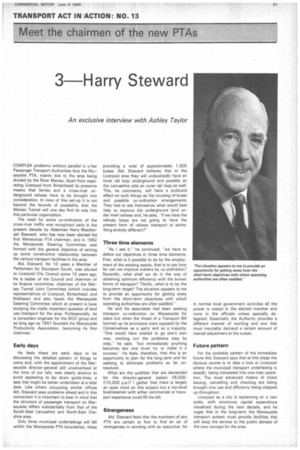3 Harry Steward
Page 63

If you've noticed an error in this article please click here to report it so we can fix it.
An exclusive interview with Ashley Taylor
COMPLEX problems without parallel in °ter Passenger Transport Authorities face the Merseyside PTA, mainly due to the area being divided by the River Mersey. Apart from separating Liverpool from Birkenhead its presence means that ferries and a cross-river underground railway have to be brought into consideration. In view of this set-up it is not beyond the bounds of possibility that the Mersey Tunnel will one day find its way into this particular organization.
The need for some co-ordination of the cross-river traffic was recognized early in the present decade by Alderman Harry Macdonald Steward, who has now been elected the first Merseyside PTA chairman, and in 1962 the Merseyside Steering Committee was formed with the general objective of setting up some constructive relationship between the various transport facilities in the area.
Ald. Steward, for 10 years a Member of Parliament for Stockport South, was elected to Liverpool City Council some 15 years ago. He is leader of the Council and chairman of its finance committee, chairman of the Mersey Tunnel Joint Committee (which includes representatives of Liverpool, Birkenhead, and Wallasey) and also heads the Merseyside Steering Committee which at present is busy studying the vitally important question of land use/transport for the area. Professionally, he is consultant engineer for the BICC group and as long ago as 1951. founded the Merseyside Productivity Association, becoming its first chairman.
Early days
He feels these are early days to be discussing the detailed pattern of things to come and, with the appointment of the Merseyside director-general still unadvertised at the time of our talk, was clearly anxious to avoid appearing to lay down guide-lines, a task that might be better undertaken at a later date. Like others occupying similar offices Aid. Steward sees problems ahead and in this connection it is important to bear in mind that the structure of passenger transport on Merseyside differs substantially from that of the South-East Lancashire and North-East Cheshire area.
Only three municipal undertakings will fall within the Merseyside PTA boundaries, these providing a total of approximately 1,500 buses. Aid. Steward believes that in the Liverpool area they will undoubtedly have an inner rail loop underground and possibly on the Lancashire side an outer rail loop as well. This, he comments, will have a profound effect on such things as the routeing of buses and possible co-ordination arrangements. They had to ask themselves what would best help to improve the underground (and under river) railway and, he asks, ''If we have the railway loops are we going to have the present form of railway transport or something entirely different?"
Three time elements
"As I see it," he continued, "we have to define our objectives in three time elements. First, what is it possible to do by the employment of the existing assets, that is to say how far can we improve matters by co-ordination? Secondly, what shall we do in the way of obtaining optimum efficiency with the known forms of transport? Thirdly, what is to be the long-term target? The situation appears to me to provide an opportunity for getting away from the short-term objectives with which operating authorities are often saddled."
He and his associates had been seeking transport co-ordination on Merseyside for years but when the threat of a Transport Bill loomed up its provisions were opposed by the Conservatives as a party and as a majority. "One would have wished to go one's own way, working out the problems step by step," he said, "but immediately anything becomes law one must try to make it a success.He feels, therefore, that this is an opportunity to plan for the long-term and for seeking to eliminate problems so far unresolved.
What are the qualities that are demanded for the director-general (salary £8,000£10,000 p.a.)? I gather that there is largely an open mind on this subject but a top-level businessman with either commercial or transport experience could fill the bill.
Strangeness
Ald. Steward feels that the members of any PTA are certain at first to find an air of strangeness in working with an executive, for
in normal local government activities all the power is vested in the elected member and none in the officials unless specially delegated. Essentially the Authority provides a different manner of working and one that must inevitably demand a certain amount of mental adjustment at the outset.
Future pattern
For the probable pattern of the immediate future Ald. Steward says that at this stage the obvious course is to take a look at Liverpool where the municipal transport undertaking is steadily being translated into one-man-operation. The most advanced means of ticket issuing, cancelling and checking are being brought into use and efficiency being stepped up throughout.
Liverpool as a city is replanning on a vast scale, with enormous capital expenditure visualized during the next decade, and he urges that in the long-term the Merseyside transport system must provide facilities that will keep the service to the public abreast of the new concept for the area.


























































































































